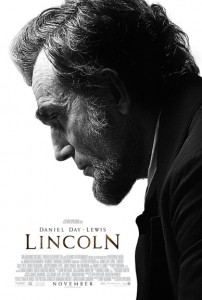Lincoln, directed by Steven Spielberg. Written by Tony Kushner. Based on the book Team of Rivals by Doris Kearns Goodwin. Starring Daniel Day-Lewis, Sally Field, David Strathairn, and Tommy Lee Jones. Rated PG-13 for an intense scene of war violence, some images of carnage, and brief strong language. Running time: 150 minutes.

Lincoln is not what I expected. It is not primarily the dramatization of the life of a man, Abraham Lincoln, the nation’s sixteenth president. It is instead the dramatization of the passage of a law, the Thirteenth Amendment to the United States Constitution, the first section of which states, “Neither slavery nor involuntary servitude, except as a punishment for crime whereof the party shall have been duly convicted, shall exist within the United States, or any place subject to their jurisdiction.” However, as the film makes clear, it is largely the force of Lincoln’s character that gave those words the force of law, so the film is aptly titled.
Few films deal fundamentally with the passage of a law. One of the few is Amazing Grace, the 2006 film about William Wilberforce, who in 1807 led the political movement to abolish the slave trade in the British Empire. Lincoln is a worthy successor, dealing with the American continuation of the same fight to abolish slavery.
And a bloody fight it was, with some six hundred thousand dead in the Civil War at a time when the population of the nation was just over thirty million—a tenth of what it is today. Mountains of bodies filled the gap between the Declaration of Independence in 1776—which declared “that all men are created equal”—and the Thirteenth Amendment in 1864.
The film begins with Lincoln on the battlefield talking to a couple of Union soldiers who, with great admiration and respect, recite to Lincoln some of the opening text from his Gettysburg Address: “Four score and seven years ago our fathers brought forth on this continent a new nation, conceived in liberty, and dedicated to the proposition that all men are created equal. . . .” This film, the viewer quickly becomes aware, is about the ideas that move men to action.
As a film about a law and the ideas leading to its passage, nearly every scene involves dialogue. Thus, the wonderful performances by the fine cast of actors take center stage. We see a few glimpses of the fires and the carnage of the battles of the war, but such action is not the focus of the film. The focus is on the power of ideas, persuasion, and the political process.
The passage of the Thirteenth Amendment was not all about the power of ideas; as the film relates, it was also about the reality of political maneuvering, cajoling, and outright bribery in the form of offers of well-paid government positions. But at its root the fight for the passage of the amendment was over fundamental political questions concerning the nature of man, the meaning of liberty, and the need of equality before the law.
Although Daniel Day-Lewis has rightly earned accolades for his performance as Lincoln, to my mind Tommy Lee Jones nearly carries away the show with his portrayal of Thaddeus Stevens, the surly radical Republican and abolitionist who excoriated his political opponents on the Capitol floor. The rowdy yet pointed political debates involving Stevens offer a welcome change from the slower pace and more somber tone of the scenes featuring Lincoln.
The film presents Lincoln as a storyteller who conveys weighty ideas using parables and anecdotes, and as a highly learned, self-taught man. At one point he tells a hilarious story involving the portrait of George Washington; and in another memorable scene, while talking with an engineer, Lincoln cogently discusses the ideas of Euclid, the Greek geometer who wrote of equality in the sphere of mathematics.
Although an excellent film in most respects (cinematography, performances, soundtrack, etc.), Lincoln relies so heavily on dialogue about the legislation and the ideas behind it that it occasionally comes across as a dry documentary—especially when contrasted with the aforementioned and emotionally moving Amazing Grace (which I highly recommend).
That minor quibble aside, Lincoln is an outstanding film. It serves as a much-needed reminder that our nation was founded on and later improved by an idea: the idea of individual rights, and its corollaries, including the need of equality before the law to protects those rights—or, as Lincoln himself put it, “our fathers brought forth on this continent a new nation, conceived in liberty, and dedicated to the proposition that all men are created equal.”


![[TEST] The Objective Standard](https://test.theobjectivestandard.com/wp-content/uploads/2017/10/logo.png)














